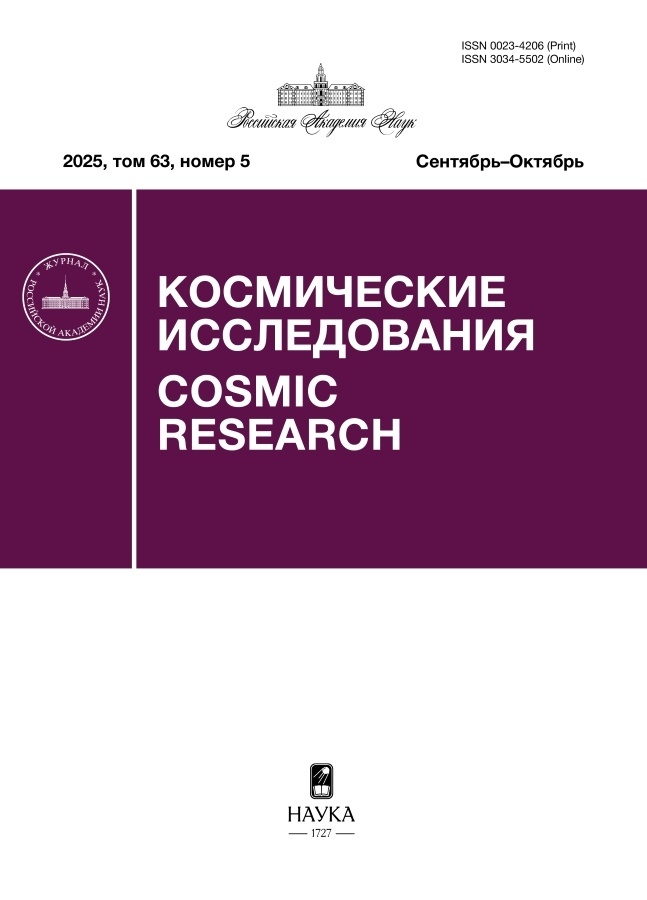Time of Flight Estimation in Low-thrust Transfers Between Asteroids Using Deep Neural Networks
- Authors: Li Z.1, Koryanov V.V.2, Zubko V.A.3
-
Affiliations:
- Lomonosov Moscow State University
- Bauman Moscow State Technical University
- Space Research Institute
- Issue: Vol 63, No 5 (2025)
- Pages: 501-514
- Section: Articles
- URL: https://journals.eco-vector.com/0023-4206/article/view/696718
- DOI: https://doi.org/10.31857/S0023420625050047
- ID: 696718
Cite item
Abstract
This paper focuses on optimizing the transfer time for multiple asteroid rendezvous missions utilizing low-thrust propulsion. An indirect method based on Pontryagin’s maximum principle is employed to generate training data by optimizing low-thrust trajectories for minimal time of flight. A deep neural network (DNN) is subsequently trained to estimate the minimum time of flight (TOF) between each pair of asteroids. To enhance the accuracy of predictions for rapid transfers (less than 150 days), the dataset is augmented with additional trajectory simulations. Leveraging the trained neural network, a Beam Search (BS) algorithm is implemented to efficiently determine the fastest sequence of rendezvous with multiple asteroids, starting from an arbitrary initial asteroid. The results demonstrate that an optimal rendezvous sequence involving 15 asteroids is achieved, with an average time of flight of 107.5 days per segment.
About the authors
Zh. Li
Lomonosov Moscow State University
Author for correspondence.
Email: lzj114065264@outlook.com
Moscow, Russia
V. V. Koryanov
Bauman Moscow State Technical University
Email: vkoryanov@mail.ru
Moscow, Russia
V. A. Zubko
Space Research Institute
Email: v.zubko@cosmos.ru
Moscow, Russia
References
- Ивашкин В.В., Чернов А.В. Оптимизация траекторий перелетов космического аппарата к сближающемуся с Землей астероиду при использовании малой тяги // Препринты ИПМ им. М.В. Келдыша. 1996. № 62. https://library.keldysh.ru/preprint.asp?id=1996-62
- Ивашкин В.В., Чернов А.В. Определение оптимальных траекторий космических полетов к сближающемуся с Землей астероиду с использованием малой тяги // Препринты ИПМ им. М.В. Келдыша. 1997. № 19. https://library.keldysh.ru/preprint.asp?id=1997-19
- Bellome A., Sanchez J.P., Kemble S. Multi-objective design of gravity assist trajectories via graph transcription and dynamic programming. Ph.D. thesis. Cranfield University, 2022.
- D’Amario L.A., Bright L.E., Wolf A.A. Galileo trajectory design // Space Science Reviews. 1992. V. 60(1). P. 23–78. https://doi.org/10.1007/BF00216849
- Prockter L., Murchie S., Cheng A. et al. The NEAR Shoemaker mission to asteroid 433 Eros // Acta Astronautica. 2002. V. 51(1–9). P. 491–500.
- Rayman M.D., Chadbourne P.A., Culwell J.S. et al. Mission design for Deep Space 1: A low-thrust technology validation mission // Acta Astronautica. 1999. V. 45(4–9). P. 381–388. https://doi.org/10.1016/S0094-5765(99)00157-5
- Accomazzo A., Ferri P., Hubault A. et al. Rosetta visits asteroid (21) Lutetia // Acta Astronautica. 2012. V. 72. P. 178–184. https://doi.org/10.1016/j.actaastro.2011.09.006
- Kawaguchi J., Fujiwara A., Uesugi T. Hayabusa – its technology and science accomplishment summary and Hayabusa-2 // Acta Astronautica. 2008. V. 62(10). P. 639–647. https://doi.org/10.1016/j.actaastro.2008.01.028
- ESA - JUICE spacecraft specs. https://www.esa.int/Science_Exploration/Space_Science/Juice/Juice_spacecraft_specs
- GTOC Portal – The Global Trajectory Optimisation Competition Portal. https://sophia.estec.esa.int/gtoc_portal/
- Понтрягин Л.С., Болтянский В.Г., Гамкрелидзе Р.В. и др. Математическая теория оптимальных процессов. М.: Физматиздат, 1983. 392 с.
- Ивашкин В.В., Крылов И.В. Оптимизация траекторий космического аппарата с электроракетным двигателем малой тяги // Препринты ИПМ им. М.В. Келдыша. 2020. № 94. С. 1–32. https://doi.org/10.20948/prepr-2020-94
- Иванюхин А.В., Петухов В.Г., Юн Сон Ук. Траектории перелета к Луне с минимальной тягой // Косм. исслед. 2022. Т. 60. № 6. С. 517–527.
- Ду Ч., Старинова О.Л. Генерация искусственных гало-орбит в окололунном пространстве с использованием двигателей малой тяги // Косм. исслед. 2022. Т. 60. С. 151–166. https://doi.org/10.31857/S0023420622020029
- Моргунов Н.В., Широбоков М.Г. Двухуровневый параметрический метод оптимизации траектории перелета с малой тягой // Препринты ИПМ им. М.В. Келдыша. 2024. № 56. С. 1–24. https://doi.org/10.20948/prepr-2024-56
- Pan B., Ran Y., Qing W. et al. Heat-equation-based smoothing homotopy method for nonlinear optimal control problems // J. Guidance, Control, and Dynamics. 2024. P. 1–14. https://doi.org/10.2514/1.G008216
- Morelli A., Hofmann C., Topputo F. A homotopic approach for robust low-thrust trajectory design through convex optimization // Proc. 72nd International Astronautical Congress. Dubai, UAE. 2021.
- Guo X., Ren D., Wu D. et al. DNN estimation of low-thrust transfer time: Focusing on fast transfers in multi-asteroid rendezvous missions // Acta Astronautica. 2023. V. 204. P. 518–530. https://doi.org/10.1016/j.actaastro.2022.09.006
- Bellome A., Sánchez J.P., Mateas J.C.G. et al. Modified dynamic programming for asteroids belt exploration // Acta Astronautica. 2024. V. 215. P. 142–155. https://doi.org/10.1016/j.actaastro.2023.11.018
- Лебедев В.Н. Расчет движения космического аппарата с малой тягой. М.: Вычислительный центр АН СССР, 1968. 108 с.
- Корнеев К.Р. Длительность перелета между круговыми компланарными орбитами с идеально регулируемым двигателем малой тяги // Материалы молодежной научной конференции “Новые горизонты прикладной математики – 2024”. Т. 1. М.: ИПМ им. М.В. Келдыша, 2024. С. 38–39. https://doi.org/10.20948/prepr-2024-10226
- Сорокин А.В., Широбоков М.Г. Разработка нейронных сетей для управления орбитальным движением космического аппарата с двигателем малой тяги // Препринты ИПМ им. М.В. Келдыша. 2018. № 269. 31 с. https://doi.org/10.20948/prepr-2018-269
- Li H., Chen S., Izzo D. et al. Deep networks as approximators of optimal low-thrust and multi-impulse cost in multitarget missions // Acta Astronautica. 2020. V. 166. P. 469–481. https://doi.org/10.1016/j.actaastro.2019.09.023
- Gao Y., Kluever C. Low-thrust interplanetary orbit transfers using hybrid trajectory optimization method with multiple shooting // AIAA/AAS Astrodynamics Specialist Conference and Exhibit. 2004. https://doi.org/10.2514/6.2004-5088
- Battin R.H. An Introduction to the Mathematics and Methods of Astrodynamics. New York: American Institute of Aeronautics and Astronautics, 1999.
- Jiang F., Baoyin H., Li J. Practical techniques for low-thrust trajectory optimization with homotopic approach // J. Guid. Control Dyn. 2012. V. 35(1). P. 245–258. https://doi.org/10.2514/1.52476
- Izzo D., Märtens M., Pan B. A survey on artificial intelligence trends in spacecraft guidance dynamics and control // Astrodynamics. 2019. V. 3(4). P. 287–299. https://doi.org/10.1007/s42064-018-0053-6
- Kurz-Kim J.-R., Loretan M. On the properties of the coefficient of determination in regression models with infinite variance variables // J. Econometrics. 2014. V. 181. Iss. 1. P. 15–24. https://doi.org/10.1016/j.jeconom.2014.02.004
- Battin R.H. An Introduction to the Mathematics and Methods of Astrodynamics. New York: American Institute of Aeronautics and Astronautics, 1999.
Supplementary files










